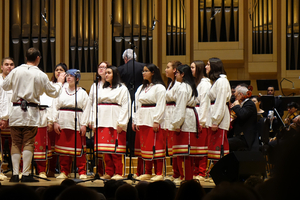Review: Cherokee Nation Claims Territory Next to APPALACHIAN SPRING
 When you think of an All-American concert at Belk Theater performed by the Charlotte Symphony, composers like Samuel Barber or Aaron Copland figure to be in the mix. Sure enough, Copland's APPALACHIAN SPRING is the marquee attraction at the latest Symphony concert led by maestro Christopher Warren-Green, preceded by Barber's equally familiar Adagio for Strings. What came between these works by a Pennsylvania blue-blood and a Brooklyn-born Jew was really surprising, enlightening, and inspiring - and frankly stole the show.
When you think of an All-American concert at Belk Theater performed by the Charlotte Symphony, composers like Samuel Barber or Aaron Copland figure to be in the mix. Sure enough, Copland's APPALACHIAN SPRING is the marquee attraction at the latest Symphony concert led by maestro Christopher Warren-Green, preceded by Barber's equally familiar Adagio for Strings. What came between these works by a Pennsylvania blue-blood and a Brooklyn-born Jew was really surprising, enlightening, and inspiring - and frankly stole the show.
That work was by a composer most of us had never heard of, William Brittelle, titled Si Otsedoha in a language most of us don't know. Commissioned by the North Carolina Symphony in 2017 and premiered the following year in Raleigh, the new piece tripled the Appalachian aspect of the concert, for the Boston-born Brittelle was raised in Newton, NC, the county seat of Catawba County. Appropriately enough, the featured performers of Si Otsedoha were the Cherokee Chamber Singers of Cherokee High School, led by Michael Yanette.
With English and Cherokee text by the Singers, the piece is divided into five sections, including a "Still Here Overture." It's forceful stuff from the beginning, with each of the Singers stepping forward to recount a segment of Native American or Cherokee history. The history goes back many millennia before the so-called "discovery" of the New World, and after each section - even after the sufferings, indignities, and betrayals inflicted by white European occupiers - the whole ensemble proclaims, "But we're still here!" with an edge of affirmation and defiance. Special rancor is reserved for President Andrew Jackson.
These young men and women are telling us things. Though they mention the infamous "Trail of Tears," they're not complaining or asking for pity. In the softer second section, "Phoenix Rising," we hear of the young people's yearnings, sung in English and Cherokee, keyed by a recurring phrase, "When I look to the sky." In the next section, we begin to notice the composer, the orchestra, soprano soloist Catherine Brookman and Yanette more; for it is here, with the women answering the men, that the Singers really begin to sing. Brittelle's music leavens the message of "When Money Becomes Religion," arguably containing the orneriest statements in the piece. The section on the Keystone Pipeline in North Dakota, in particular, aren't intended to salve the sensibilities of Evangelicals or Republicans.
Adorned with silvery percussion and gossamer harp strings, "Walls of Glass" is the most soothing and ethereal section of the piece, where the lyricism of the composer and the harmony of the ensemble shine most brilliantly. The finale, "Si Otsedoha," circles back to the "We're still here" message of the opening section, but the Cherokee version is spoken with far less defiance than the earlier English preamble. Gradually the music, the singing, and the chanting grow insistent, then exclamatory and celebratory - with a little bit of a militant edge. The next time Native Americans wish to protest construction of a new pipeline that violates existing treaties, Si Otsedoha (first word is pronounced "she") would be a stirring, powerful statement to fire up demonstrations.
Though Barber's Adagio has been programmed at least twice since I heard Jacomo Rafael Bairos conduct it at Knight Theater in 2011, I had never seen what Warren-Green would do with it. Nobody who loves this affecting work will be disappointed. The cellos, violins, and even the violas get opportunities to stand apart during this eight-minute warhorse, and all three perform precisely and sensitively. Watching the performance is a treat - and after navigating the unexpected Uptown detours to find a feasible pathway to the Belk, which seemed to confound Google Maps as much as me, I can heartily credit the players for soothing my frazzled nerves.
Copland's APPALACHIAN SPRING was more of a surprise than the Barber, last performed here in October 2015. After a moribund rendition of the score in 1993, which I consistently cite as among the most wretched Symphony performances I've ever witnessed, the orchestra conquered Copland's iconic ballet suite the next two times I heard it in 2009 and 2015. For the current concert, Warren-Green expands his conquest, restoring music from the original Martha Graham ballet, which Copland called "Ballet for Martha" before Graham discerned spring in the music and took the eventual title from Hart Crane's The Bridge.
Chamber and orchestral versions that flowed from the 1944 ballet abbreviated the score. Neither of the recordings in my collection break down the piece, but those conducted by Bernstein, Mehta, and Copland are among those you can find on Spotify. Of these, only Mehta's begins to describe the ballet scenario with any of the detail that you'll find so helpfully reproduced in Symphony's program booklet. I suspect the absence or abbreviation of Section 4, "The revivalist and his flock," was one of the things made that lamentable 1993 version so lifeless.
The "Calm and flowing" Section 7 of the piece, memorable for all its voicings of the "Simple Gifts" Shaker melody - by the violas, the cellos, and (most memorably) the clarinet - seemed to come with more off-road excursions by piano, brass, and percussion before the unforgettable orchestral explosion that Charlotte Symphony plays so grandly together. It may be a less cohesive Spring than Copland conceived in his suite, but after hearing the same-old-same-old so many times, I found it fresher and even more satisfying.
Reader Reviews

Videos
